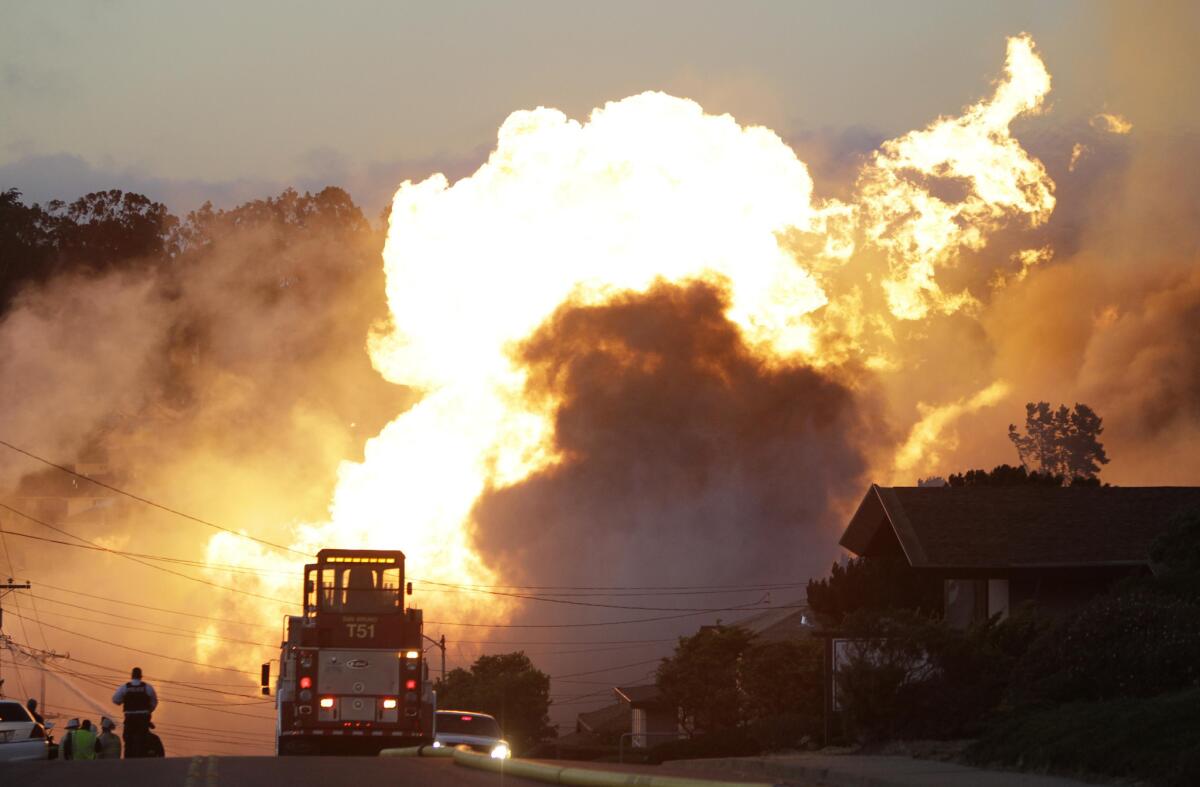Funds for safety went to utility execs’ pay instead, PUC president says

- Share via
REPORTING FROM SACRAMENTO — Money collected from ratepayers and earmarked for pipeline safety was instead spent on executive pay raises by the state’s largest utility, Pacific Gas & Electric Co., in the months before a deadly pipeline explosion in 2010, lawmakers were told Wednesday.
“In some cases, the utility did divert dollars we approved for safety purposes for executive compensation,” the new president of the Public Utilities Commission complained to members of the state Senate Energy, Utilities and Communications Committee at an oversight hearing.
After the two-hour hearing, Michael Picker told The Times that he’s gathering additional documentation that PG&E put off safety and maintenance work to boost its profits and provide top executives with bonuses.
“This is one of my outstanding beefs,” he said.
The issue of the bonuses first was raised in a January 2012 independent audit for the PUC and an accompanying commission staff report.
But Picker’s testimony “was the first time that I ever heard a PUC official admit that or state that as a fact,” said state Sen. Jerry Hill (D-San Mateo). Hill represents the Bay Area community of San Bruno, where the PG&E pipeline blast killed eight people, injured 66 others and destroyed 38 homes.
Records released a few days after the explosion showed that PG&E received approval in 2007 to spend $5 million of ratepayer money to replace a high-risk section of the 30-inch pipeline north of the San Bruno blast site.
The work on the 1950s-era pipe was never performed. And in 2010, the utility asked for another $5 million to do the same job, according to PG&E documents submitted to the PUC.
On Wednesday, PG&E in a statement stressed that it’s always been committed to pipeline safety. “Even predating the San Bruno accident, the company has spent more on the safety of its gas system than provided for by its regulators,” said spokesman Donald Cutler. “And since the explosion, it’s spent or committed to spend more than $2.8 billion of shareholder funds ... on gas system enhancements.”
Picker’s willingness to publicly commit to investigating PG&E’s executive compensation program is significant, said San Bruno City Manager Connie Jackson.
It shows that Picker and the commission’s leadership, unlike his predecessor Michael Peevey, “is not essentially covering up for PG&E,” she said. Peevey has not responded to numerous requests for comment.
Picker’s comments came during the last of a series of oversight hearings by the Senate committee.
The hearings were sparked by an unfolding scandal at the powerful PUC over improper communications between PG&E and key state regulatory decision makers.
The communications and other potential wrongdoing are targets of investigations by the U.S. attorney’s office in San Francisco and the California attorney general’s office.
A separate federal investigation resulted in criminal charges being filed against PG&E in connection with San Bruno.
The National Transportation Safety Board, which investigated the San Bruno incident, described the explosion as an “organizational accident.” PG&E engaged in a number of deficient operational and managerial practices that directly led to the accident, the board said.
PUC President Picker has proposed a record-high $1.6-billion penalty against the company as part of the commission’s ongoing disciplinary proceeding.
Picker, who’s been president of the commission for only three months, said he’s elevated safety as his agency’s top priority and has put an emphasis on inspections, enforcement and speedy citations for violators. His goal, he said, is “putting more eyes on holes in the ground.”
Commission staff, meanwhile, is working to restore trust in the PUC, improve technology and record keeping and to better assess risks, said Wendy Pratt, an outside consultant.
The PUC now is saying the right things about safety, Sen. Hill said. “What I heard showed a lot of failures and problems,” he said. “Then, I heard a lot of apologies and commitments to change ... which is encouraging.”
Twitter: @MarcLifsher
More to Read
Inside the business of entertainment
The Wide Shot brings you news, analysis and insights on everything from streaming wars to production — and what it all means for the future.
You may occasionally receive promotional content from the Los Angeles Times.











